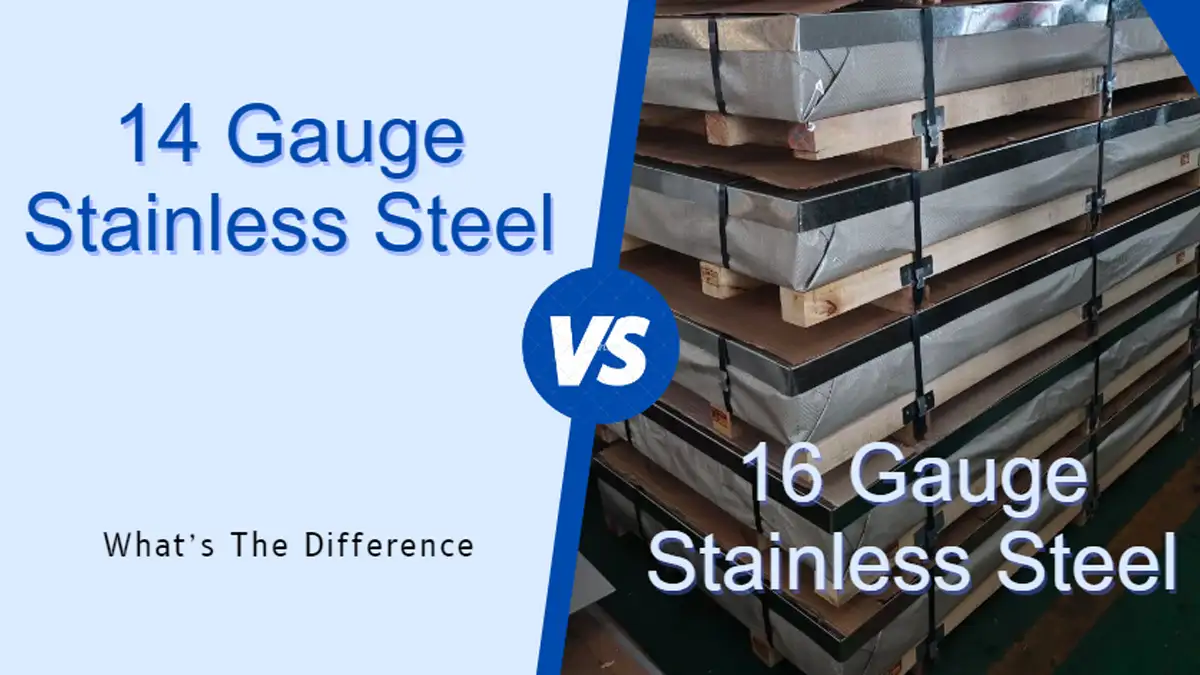The gauge generally defines the thickness of stainless steel, durability, and strength. As lower the gauge number the steel becomes thicker.
14 and 16 gauge stainless steel is most widely used in industrial and domestic applications. Both of these gauge standards are known for their durability and stability.
They are suitable for many needs. The 16 gauge steel is about 0.0625 inches (1.59mm) thick, and the 14 gauge steel is 0.0781(1.98mm) inches thick, and it is approx. 30% ticker than 16 gauge stainless steel.
The gauge is the unit of measurement that describes the metal thickness. British men working with metal wire invented this measuring unit in the nineteenth century. It was developed in order to provide a standard measuring technique for metal and wire thickness.
The main difference between these two is thickness.
The 14 gauge steel is thicker than 16 gauge, which means it has more strength and durability than 16 gauge.
Continue reading to find out more about the differences, cost, thickness, and applications of these two gauge standard and why it is so important.
Let’s discover more if you want to know more about 14 gauge and 16 gauge stainless steel and their difference.
Stainless steel is very versatile material for a wide range of products, from home appliances to industrial equipment.
When discussing this specific type of stainless steel, you may hear a statement such as “14 gauge stainless steel.” Hence, what does this all mean?
In simple terms, stainless steel gauge relates to its thickness, the higher numbers indicating a thinner sheet of metal.
The alloy 14 gauge stainless steel is a slightly thick variation of this alloy, and the thickness of this gauge standard is more than 16-gauge stainless steel.
Its toughness and sustainability make it an excellent choice for industries requiring strength, including construction and automotive production.
14 gauge stainless steel is a material that can withstand the most demanding activities, whether you’re choosing this gauge standard for industrial use or domestic purposes.
What is 16 Gauge Stainless Steel?
16 gauge stainless steel is a better choice for many applications. It is a metal recognized for its strength, endurance, and corrosion resistance properties.
The thickness of this specific grade of steel is measured in gauges, as the name implies, with 16 being quite thick gauge, but its thickness is less than 14 gauge stainless steel.
Furthermore, it is widely utilized in applications where toughness is important, such as structural supports in the construction field or equipment parts in the manufacturing sector.
It is not only durable, but it also retains its luster even after prolonged exposure to harsh conditions. If you want a metal that will survive for an extended period of time, 16 Gauge Stainless Steel is an excellent choice.
Difference between 14 Gauge and 16 Gauge Stainless Steel
The most fundamental difference between the 14 gauge and 16 gauge stainless steel is that the 14 gauge is thicker.
Because thicker materials are stronger, 14 gauge steel is typically more durable and stronger than 16 gauge steel. As a general principle, use the thickest material that matches your budget.
Keep this state in mind while choosing the desired thickness of the material; the greater the number, the thinner the material.
Therefore, 14 gauge stainless steel is usually your best pick for a strong, durable material for your project.
However, if you require a thinner material with strong corrosion resistance or weldability, 16 gauge may be more suitable. Finally, it all comes down to the type of project you’re working on and how much money you’re willing to spend on installation materials and labor.
You can also measure the gauge thickness of any material by yourself at home with the specific thickness gauge. There are three different types of thickness gauges are used to measure the thickness
- Material thickness gauge
- Sheet metal and wire thickness gauge
- Coating thickness gauge
Thickness
Generally, the gauge number shows the thickness of the stainless steel, and it is measured in inches. The thickness of 14 gauge stainless steel is 0.0781 inch, whereas the thickness of 16 gauge stainless steel is 0.0625 inch. As a result, 14 gauge stainless steel is more durable and thicker than 16 gauge stainless steel.
Uses and applications
14 gauge stainless steel is mostly used for heavy-duty countertops’ structural and architectural applications where a high level of durability is required. On the other hand, 16-gauge stainless steel is mostly used for kitchen hoods.
Cost
Due to the fact that 14-gauge stainless steel is thicker and stronger than 16 gauge stainless steel, it is more expensive.
Maintenance
The maintenance of 14 gauge stainless steel is easier than 16 gauge stainless steel because this gauge is thicker, and it does not get scratched and dented easily.
Other Differences
- The thickness of 14 gauge stainless steel is greater than that of 16 gauge stainless steel.
- 14 gauge stainless steel lasts longer than 16 gauge stainless steel.
- The cost of 14 gauge stainless steel is higher than that of 16 gauge stainless steel.
- 14 gauge stainless steel is better corrosion resistant than 16 gauge stainless steel.
- It is harder to cut 14 gauge stainless steel than 16 gauge stainless steel.
Conclusion
In conclusion, it is clear that both gauge standards of stainless steel are mostly widely used and have a special place in the industry and at home.
If you want to buy a specific gauge thickness for your project, then keep in mind all the information and differences between 14 gauge and 16 gauge stainless steel.
By doing this practice, you will be able to get more suitable material for your project.
In the end, you have to remember that 14 gauge is thicker than 16 gauge.
Thus, it will normally give better strength and durability, although 14 gauge steel is more expensive than 16 gauge steel.
HZW closely follows the pace of the times, innovation is the force that drives HZW to make improvement constantly. We use world-leading equipment and advanced technology, and continuously streamline our production process, aiming to provide customers with the best stainless steel strips products.












